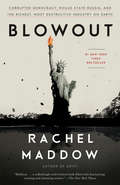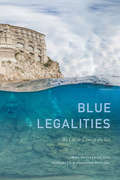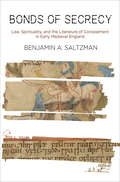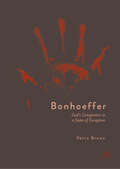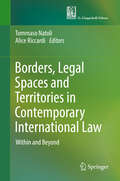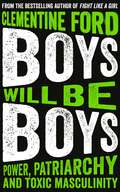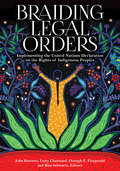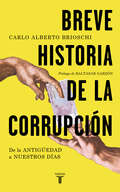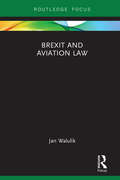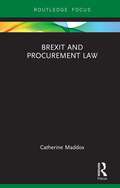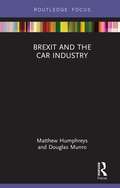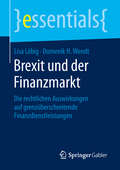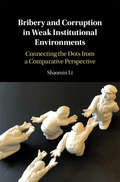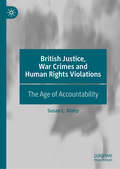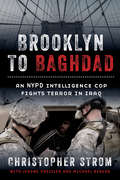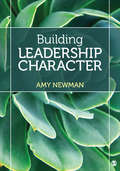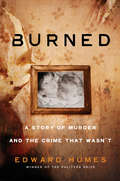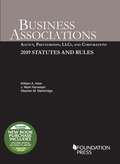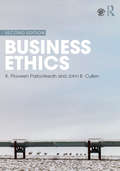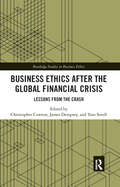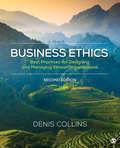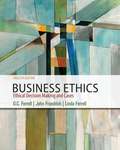- Table View
- List View
Blowout: Corrupted Democracy, Rogue State Russia, and the Richest, Most Destructive Industry on Earth
by Rachel MaddowBig Oil and Gas Versus Democracy—Winner Take All <P><P>In 2010, the words “earthquake swarm” entered the lexicon in Oklahoma. That same year, a trove of Michael Jackson memorabilia—including his iconic crystal-encrusted white glove—was sold at auction for over $1 million to a guy who was, officially, just the lowly forestry minister of the tiny nation of Equatorial Guinea. And in 2014, Ukrainian revolutionaries raided the palace of their ousted president and found a zoo of peacocks, gilded toilets, and a floating restaurant modeled after a Spanish galleon. <P><P>Unlikely as it might seem, there is a thread connecting these events, and Rachel Maddow follows it to its crooked source: the unimaginably lucrative and equally corrupting oil and gas industry. With her trademark black humor, Maddow takes us on a switchback journey around the globe, revealing the greed and incompetence of Big Oil and Gas along the way, and drawing a surprising conclusion about why the Russian government hacked the 2016 U.S. election. She deftly shows how Russia’s rich reserves of crude have, paradoxically, stunted its growth, forcing Putin to maintain his power by spreading Russia’s rot into its rivals, its neighbors, the West’s most important alliances, and the United States. <P><P>Chevron, BP, and a host of other industry players get their star turn, most notably ExxonMobil and the deceptively well-behaved Rex Tillerson. The oil and gas industry has weakened democracies in developed and developing countries, fouled oceans and rivers, and propped up authoritarian thieves and killers. But being outraged at it is, according to Maddow, “like being indignant when a lion takes down and eats a gazelle. You can’t really blame the lion. It’s in her nature.” <P><P>Blowout is a call to contain the lion: to stop subsidizing the wealthiest businesses on earth, to fight for transparency, and to check the influence of the world’s most destructive industry and its enablers. The stakes have never been higher. As Maddow writes, “Democracy either wins this one or disappears.” <P><P><b>A New York Times Bestseller</b>
Blue Legalities: The Life and Laws of the Sea
by Irus Braverman Elizabeth R. Johnson Eds.The ocean and its inhabitants sketch and stretch our understandings of law in unexpected ways. Inspired by the blue turn in the social sciences and humanities, Blue Legalities explores how regulatory frameworks and governmental infrastructures are made, reworked, and contested in the oceans. Its interdisciplinary contributors analyze topics that range from militarization and Maori cosmologies to island building in the South China Sea and underwater robotics. Throughout, Blue Legalities illuminates the vast and unusual challenges associated with regulating the turbulent materialities and lives of the sea. Offering much more than an analysis of legal frameworks, the chapters in this volume show how the more-than-human ocean is central to the construction of terrestrial institutions and modes of governance. By thinking with the more-than-human ocean, Blue Legalities questions what we think we know—and what we don&’t know—about oceans, our earthly planet, and ourselves. Contributors. Stacy Alaimo, Amy Braun, Irus Braverman, Holly Jean Buck, Jennifer L. Gaynor, Stefan Helmreich, Elizabeth R. Johnson, Stephanie Jones, Zsofia Korosy, Berit Kristoffersen, Jessica Lehman, Astrida Neimanis, Susan Reid, Alison Rieser, Katherine G. Sammler, Astrid Schrader, Kristen L. Shake, Phil Steinberg
Bonds of Secrecy: Law, Spirituality, and the Literature of Concealment in Early Medieval England (The Middle Ages Series)
by Benjamin A. SaltzmanWhat did it mean to keep a secret in early medieval England? It was a period during which the experience of secrecy was intensely bound to the belief that God knew all human secrets, yet the secrets of God remained unknowable to human beings. In Bonds of Secrecy, Benjamin A. Saltzman argues that this double-edged conception of secrecy and divinity profoundly affected the way believers acted and thought as subjects under the law, as the devout within monasteries, and as readers before books. One crucial way it did so was by forming an ethical relationship between the self and the world that was fundamentally different from its modern reflex. Whereas today the bearers of secrets might be judged for the consequences of their reticence or disclosure, Saltzman observes, in the early Middle Ages a person attempting to conceal a secret was judged for believing he or she could conceal it from God. In other words, to attempt to hide from God was to become ensnared in a serious sin, but to hide from the world while deliberately and humbly submitting to God's constant observation was often a hallmark of spiritual virtue.Looking to law codes and religious architecture, hagiographies and riddles, Bonds of Secrecy shows how legal and monastic institutions harnessed the pervasive and complex belief in God's omniscience to produce an intense culture of scrutiny and a radical ethics of secrecy founded on the individual's belief that nothing could be hidden from God. According to Saltzman, this ethics of secrecy not only informed early medieval notions of mental activity and ideas about the mind but also profoundly shaped the practices of literary interpretation in ways that can inform our own contemporary approaches to reading texts from the past.
Bonhoeffer: God’s Conspirator in a State of Exception
by Petra BrownTheologian. Conspirator. Martyr. Saint. Dietrich Bonhoeffer was killed in the waning days of World War II, having been implicated in the July 20th assassination attempt on Hitler. Since his death, Bonhoeffer’s life and writings have inspired contradictory responses. He is often seen as a model for Christian pacifist resistance, and more recently for violent direct political action. Bonhoeffer’s name has been invoked by violent anti-abortion protestors as well as political leaders calling for support on a ‘war on terror’ in the aftermath of 9/11. Petra Brown critically analyses Bonhoeffer’s writing preceding and during his conspiracy involvement, particularly his recurring concept of the ‘extraordinary.’ Brown examines this idea in light of ‘the state of exception,’ a concept coined by the one-time Nazi jurist and political theorist, Carl Schmitt. She also draws on the existentialist philosopher Sören Kierkegaard to consider what happens when discipleship is understood as obedience to a divine command. This book aims to complicate an unreflective admiration of Bonhoeffer’s decision for conspiracy, and draws attention to the potentially dangerous implications of his emerging political theology.
Borders, Legal Spaces and Territories in Contemporary International Law: Within and Beyond
by Tommaso Natoli Alice RiccardiThis book examines the challenges posed to contemporary international law by the shifting role of the border, which has recently re-emerged as a central issue in international relations. It posits that borders do not merely correspond to States’ boundaries: indeed, while remaining a fundamental tool for asserting States’ power, they are in fact a collection of constantly changing spatial limits. Consequently, the book approaches borders as context-specific limits and revisits notions traditionally linked to them (jurisdiction, sovereignty, responsibility, individual rights), while also adopting the innovative approach of viewing borders as phenomena of both closedness and openness. Accordingly, the first part of the book addresses what happens “within” borders, investigating the root causes of the emergence of spatial limits and re-assessing apparent extra-territorial assertions of State power. In turn, the second part not only explores typical borderless spaces, but also more generally considers the exercise of States’ and international organisations’ powers and prerogatives across or “beyond” borders.
Boys Will Be Boys: Power, Patriarchy and Toxic Masculinity
by Clementine FordThe incendiary new book about toxic masculinity and misogyny from Clementine Ford, author of the best-selling feminist manifesto, Fight Like A Girl. Fearless feminist heroine Clementine Ford&’s incendiary first book, Fight Like A Girl, is taking the world by storm, galvanising women to demand and fight for real equality and not merely the illusion of it. Now Boys Will Be Boys examines what needs to change for that equality to become a reality. It answers the question most asked of Clementine: 'How do I raise my son to respect women and give them equal space in the world? How do I make sure he's a supporter and not a perpetrator?' Ford demolishes the age-old assumption that superiority and aggression are natural realms for boys, and demonstrates how toxic masculinity creates a disturbingly limited and potentially dangerous idea of what it is to be a man. Crucially, Boys Will Be Boys reveals how the patriarchy we live in is as harmful to boys and men as it is to women and girls, and asks what we have to do to reverse that damage. The world needs to change and this book shows the way.
Braiding Legal Orders: Implementing the United Nations Declaration on the Rights of Indigenous Peoples
by John Borrows Oonagh E. Fitzgerald Larry Chartrand Risa SchwartzImplementation in Canada of the United Nations Declaration on the Rights of Indigenous Peoples (UNDRIP) is a pivotal opportunity to explore the relationship between international law, Indigenous peoples' own laws, and Canada's constitutional narratives. Two significant statements by the current Liberal government – the May 2016 address by Indigenous Affairs Minister Carolyn Bennett to the Permanent Forum on Indigenous Issues at the United Nations and the September 2017 address to the United Nations by Prime Minister Justin Trudeau – have endorsed UNDRIP and committed Canada to implementing it as “a way forward” on the path to genuine nation-to-nation relationships with Indigenous peoples. In response, these essays engage with the legal, historical, political, and practical aspects of UNDRIP implementation. Written by Indigenous legal scholars and policy leaders, and guided by the metaphor of braiding international, domestic, and Indigenous laws into a strong, unified whole composed of distinct parts, the book makes visible the possibilities for reconciliation from different angles and under different lenses.
Braiding Legal Orders: Implementing the United Nations Declaration on the Rights of Indigenous Peoples
by John Borrows, Larry Chartrand, Oonagh E. Fitzgerald and Risa Schwartz, EditorsImplementation in Canada of the United Nations Declaration on the Rights of Indigenous Peoples (UNDRIP) is a pivotal opportunity to explore the relationship between international law, Indigenous peoples' own laws, and Canada's constitutional narratives.Two significant statements by the current Liberal government - the May 2016 address by Indigenous Affairs Minister Carolyn Bennett to the Permanent Forum on Indigenous Issues at the United Nations and the September 2017 address to the United Nations by Prime Minister Justin Trudeau - have endorsed UNDRIP and committed Canada to implementing it as “a way forward” on the path to genuine nation-to-nation relationships with Indigenous peoples. In response, these essays engage with the legal, historical, political, and practical aspects of UNDRIP implementation. Written by Indigenous legal scholars and policy leaders, and guided by the metaphor of braiding international, domestic, and Indigenous laws into a strong, unified whole composed of distinct parts, the book makes visible the possibilities for reconciliation from different angles and under different lenses.
Breve historia de la corrupción: De la Antigüedad a nuestros días
by Carlo Alberto Brioschi«Una lectura deliciosa, purificante e imprescindible para todo aquel que quiera levantar la cabeza y contemplar -desde una perspectiva más erudita- la poza de mierda en la que chapotean muchos de nuestros egregios conciudadanos.»Quim Monzó, La Vanguardia Políticos, gobernantes, empresarios de cualquier ralea: todos han encontrado en su camino el sutil y penetrante hedor de la corrupción, desde la antigua civilización mesopotámica, donde la reciprocidad regalo-favor era una costumbre consolidada, hasta las irresueltas cuestiones morales de nuestros días. Al final del recorrido, es lamentable comprobar, como destaca Garzón en su contundente prólogo, que «tampoco han cambiado tanto las cosas; en España y fuera de España se mercadea con los cargos públicos, se aceptan regalos e incluso se defiende vehementemente que éstos son una costumbre social». Esta erudita, divertida y breve historia traza las «proezas corruptivas» de los grandes y menos grandes personajes de la historia, con especial hincapié en los gobernantes, los políticos, los funcionarios públicos y los numerosos estafadores financieros a lo largo de cuatro mil años. Reseña:«La narración breve y concisa es un arte, un don que Brioschi posee y utiliza en este brillante libro.»Roberto Coalda, Il Sole 24 Ore
Brexit and Aviation Law (Legal Perspectives on Brexit)
by Jan WalulikFocusing on the consequences of Brexit for aviation law, this book presents the key legal issues for aviation business and administration, as well as all major stakeholders that could potentially be affected by Brexit. This will include airlines, airports, aerospace manufacturers, regulatory and judicial institutions, passengers and employees. The book will indicate groups of legal acts disturbed by Brexit and those few that will remain untouched, and develop on this basis a digest of regulatory and institutional problems that will arise in various areas of the discussed sector. Finally, the short title will deliberate on the directions of possible actions which may be undertaken to avoid post-Brexit legal incoherence. This review should give essential guidance to the industry and the authorities on both sides of the English Channel as to what to expect and how to prepare for the forthcoming legal earthquake.
Brexit and Procurement Law (Legal Perspectives on Brexit)
by Catherine MaddoxPublic procurement law, regulating public sector purchasing of certain contracts for goods, works and services, is an area of EU law which is closely intertwined with the UK's economy. It will almost inevitably be affected by the consequences of Brexit. At a time of significant uncertainty, this book explores policy directions which domestic procurement law could take in the future, including whether 'Buy National' policies might feasibly be introduced, or whether existing procurement procedures could be significantly reviewed.
Brexit and the Car Industry (Legal Perspectives on Brexit)
by Matthew Humphreys Doug MunroOne of the principal arguments put forth by Brexit supporters is that by freeing the UK from the stranglehold of EU law, the country will be able to expand its markets through increased bilateral trade and enhance economic growth. This book tests this proposition by reference to the car industry. Brexit and the Car Industry explores the international position of the car market to argue that the hope of Brexit bringing regulatory freedom is illusory. The book starts by examining the structure of the vehicle industry, how its regulatory framework evolved and how the environment in which it operates is constrained by international standards and the practicalities associated with trading across different regulatory systems. By examining the evolution of vehicle regulations, particularly related to the environment, it argues that a UK independent path is not only impractical but self-defeating. The private car market is structured in such a way that is global, and meeting the various international regulatory requirements is a price of entry requirement which no bilateral trade agreements are likely to alter. The book also considers changing environment affecting the car industry in the context of an aspiration for regulatory freedom. The response to climate change and the impact of technological change – specifically driverless vehicles – are big questions for the industry and both are examined in this book. The book also considers the emergence of large metropolitan areas imposing their own use and environmental requirements operating separately to national standards. The future of electric and autonomous vehicles combined with the complexity of the regulatory environment with both international and localised pollution measures make the UK navigating a safe independent path through with a viable car industry highly questionable. Providing a comprehensive review of the relationship between regulatory frameworks and free trading models, this book is aimed at industry and legal professionals. It will also be of interest to students studying market behaviour, free trade law and the free movement of goods, and environmental protection.
Brexit und der Finanzmarkt: Die rechtlichen Auswirkungen auf grenzüberschreitende Finanzdienstleistungen (essentials)
by Lisa Löbig Domenik H. WendtDer sog. „Brexit“ ist einer der wohl größten Einschnitte in der Geschichte der Europäischen Union. Für die im Finanzmarkt der EU agierenden Akteure stellt sich zunehmend die Frage, unter welchen Voraussetzungen nach dem Brexit grenzüberschreitende Finanzdienstleistungen erbracht oder in Anspruch genommen werden können. Lisa Löbig und Domenik H. Wendt skizzieren die möglichen rechtlichen Folgen, die ein harter Brexit für deutsche und britische Finanzmarktteilnehmer mit sich bringt. Hierbei wird auf ausgewählte Beispiele aus dem Finanzmarkt unter Berücksichtigung wirtschaftlicher und rechtlicher Aspekte eingegangen.Die Autoren: Lisa Löbig ist Absolventin des Studiengangs Wirtschaftsrecht (LL.B.) an der Frankfurt University of Applied Sciences und frühere Mitarbeiterin am Fachbereich Wirtschaft und Recht. Derzeit ist sie bei einer Wirtschaftsprüfungsgesellschaft in Frankfurt am Main tätig. Prof. Dr. Domenik H. Wendt, LL.M. ist Professor für Bürgerliches Recht, Europäisches Wirtschaftsrecht und Europarecht an der Frankfurt University of Applied Sciences und Direktor des Instituts für Vertragsgestaltung und Konfliktlösung (IVK).
Bribery and Corruption in Weak Institutional Environments: Connecting the Dots from a Comparative Perspective
by Shaomin LiDrawing on twenty years of research and observations, Li explains how bribery and corruption are carried out in countries with weak institutional environments, and how these activities become globalized. By distinguishing rule-based, relation-based and clan-based governance, this book offers a novel explanation to the age-old puzzle of why some countries thrive despite corruption. It also sheds lights on the symbiotic roles corruption and anticorruption campaigns play in maintaining dictatorships. Applying cost-benefit analysis to different governance environments, Li argues that as non-rule-based economies expand, the transition from relying on private relationships to relying on public rules is inevitable. However, by highlighting the globalization of corruption by non-rule-based countries, this book warns against the potential threats and consequences of bribery by powerful dictatorial governments. This book will appeal to scholars, analysts and graduate students studying corruption, as well as policymakers, business professionals and executives seeking insights into the characteristics of bribery and corruption within different institutional settings.
British Justice, War Crimes and Human Rights Violations: The Age of Accountability
by Susan L. KempThis book examines the UK approach to investigating international crimes and serious human rights violations. In 2010, the United Nations Secretary General referred to the emerging system of international justice, including the creation of the International Criminal Court, as the ‘Age of Accountability.’ However, the UK has sometimes struggled to comply with its international law obligations. Using examples from the post-World War II period to 2018, interviews with leading UK military lawyers and newly disclosed official documents, this work explains the legal duties, how the UK military and civilian justice systems investigate alleged military misconduct and highlights the challenges involved. It provides suggestions on strengthening domestic law and policy and its importance for the UK’s legitimacy as an exporter of rule of law expertise. This text is essential reading for practitioners, academics, government officials and students of international, criminal, humanitarian or human rights law.
Brooklyn to Baghdad: An NYPD Intelligence Cop Fights Terror in Iraq
by Jerome Preisler Michael Benson Christopher StromBrooklyn to Baghdad is the true story of a retired NYPD intelligence sergeant applying his street-cop tactics and interrogation skills against a lethal insurgency that had infected Iraq. A group of retired Special Forces soldiers and law enforcement experts came together to form the counterinsurgency group codenamed "Phoenix Team." Exposing the corruption of both the Iraqi and US governments, the team faced serious setbacks and challenges. Brooklyn to Baghdad shows the effectiveness of Phoenix Team, their ability to process forensic evidence and human intelligence gleaned through interrogations at the point of capture to provide direct targeting for follow-on missions. This memoir also illustrates the politics of Washington, DC, and the US Army in the war-fighting effort, which continually hampered complete success while simultaneously preserving career aspirations. Throughout are many humorous and emotional anecdotes that reveal the men behind the missions and the toll the theater of war takes on real human lives
Building Leadership Character: Lessons In Authenticity And Credibility
by Amy NewmanExtending beyond traditional leadership books to offer readers a path for developing their own character, this compelling new text uses a storytelling approach and real-world cases to explore different dimensions of leadership character. With a clear, student-friendly writing style, bestselling author Amy Newman deftly captures various approaches in which corporations and people respond to situations in difficult times and learn from mistakes. Using real companies and situations, each chapter examines a leadership character dimension such as accountability, integrity, authenticity, and courage. Readers will learn to develop their own character, emotional intelligence, and leadership skills as they engage with assessments, reflection opportunities, and exercises.
Building Leadership Character: Lessons In Authenticity And Credibility
by Amy NewmanExtending beyond traditional leadership books to offer readers a path for developing their own character, this compelling new text uses a storytelling approach and real-world cases to explore different dimensions of leadership character. With a clear, student-friendly writing style, bestselling author Amy Newman deftly captures various approaches in which corporations and people respond to situations in difficult times and learn from mistakes. Using real companies and situations, each chapter examines a leadership character dimension such as accountability, integrity, authenticity, and courage. Readers will learn to develop their own character, emotional intelligence, and leadership skills as they engage with assessments, reflection opportunities, and exercises.
Burned: A Story of Murder and the Crime That Wasn't
by Edward HumesWas a monstrous killer brought to justice or an innocent mother condemned?On an April night in 1989, Jo Ann Parks survived a house fire that claimed the lives of her three small children. Though the fire at first seemed a tragic accident, investigators soon reported finding evidence proving that Parks had sabotaged wiring, set several fires herself, and even barricade her four-year-old son inside a closet to prevent his escape. Though she insisted she did nothing wrong, Jo Ann parks received a life sentence without parole based on the power of forensic fire science that convincingly proved her guilt.But more than a quarter century later, a revolution in the science of fire has exposed many of the incontrovertible truths of 1989 as guesswork in disguise. The California Innocence Project is challenging Parks's conviction and the so-called science behind it, claiming that false assumptions and outright bias convicted an innocent mother of a crime that never actually happened.If Parks is exonerated, she could well be the "Patient Zero" in an epidemic of overturned guilty verdicts--but only if she wins. Can prosecutors dredge up enough evidence and roadblocks to make sure Jo Ann Parks dies in prison? No matter how her last-ditch effort for freedom turns out, the scenes of betrayal, ruin, and hope will leave readers longing for justice we can trust.
Business Associations: Agency, Partnerships, LLCs, and Corporations and 2019 Statutes and Rules
by William Klein Stephen Bainbridge Mark RamseyerThis statutory supplement includes statutes and rules relevant to all business entities. It is suitable for use with all textbooks and casebooks for such courses. It includes all updates to the statutes and rules.
Business Ethics
by John B. Cullen K. Praveen ParboteeahA foundational text for the modern business student and an essential instructor resource, this book presents a thorough and comprehensive introduction to business ethics. Taking a strategic stakeholder approach—one that emphasizes how important it is to balance multiple stakeholders’ needs—students will develop the critical skills they need to analyze and solve complex ethical issues, while ensuring overall business success. The second edition retains Business Ethics’ strong balance of theory and practice, but incorporates several new features, including: Fresh cases ensuring students are exposed to the most topical real-world examples A global view, with examples from international and emerging markets, and coverage of ethical standards from around the world An expanded chapter on individual ethical decision-making, as well as a new chapter devoted to ethical theory A renewed emphasis on the popular boxed features with more integration of newer case studies, and the addition of "Emerging Market Business Ethics Insights" The latest data on business ethics and ethics related issues from a variety of reputable sources A comprehensive set of lecture slides, test questions, and instructor notes provide additional material for the classroom.
Business Ethics After the Global Financial Crisis: Lessons from The Crash (Routledge Studies in Business Ethics)
by Tom Sorell Christopher Cowton James DempseyThe global financial crisis (GFC) that began in 2007 concentrated attention on the morality of banking and financial activities. Just as mainstream businesses became increasingly defined by their financial performance, banks, it seemed, got themselves – and everyone else – into trouble through an over-emphasis on themselves as commercial enterprises that need pay little attention to traditional banking virtues or ethics. While the GFC had many causes, criticism was legitimately levelled at banks over the ethics of mortgage creation, excessive securitisation, executive remuneration, and high-pressure customer sales tactics, amongst other things. These criticisms mirror those that have been levelled at the business more generally, particular in the last decade, although the backdrop provided by the GFC is more dramatic, and the outcomes of supposed wrongdoing more severe. This book focuses on business ethics after the GFC; not on the crisis itself, but how we should respond to it. The GFC has focused minds on the proper role of ethics in the understanding and conduct of business activity, but it is essential to look beyond the crisis to address the deeper challenges that it highlights. The aim of this volume is to present examples of the latest philosophically-informed thinking across a range of ethical issues that relate to business activity, using the banks and the GFC – the consequences of which continue to reverberate – as a point of departure. The book will be of great value to researchers, academics, practitioners, and students interested in business, ethics in general, and business ethics in particular.
Business Ethics: Best Practices for Designing and Managing Ethical Organizations
by Denis CollinsBusiness Ethics: Best Practices for Designing and Managing Ethical Organizations, Second Edition focuses on how to create organizations of high integrity and superior performance. Author Denis Collins shows how to design organizations that reinforce ethical behavior and reduce ethical risks using his unique Optimal Ethics Systems Model that outlines how to hire and train ethical employees, make ethical decisions, and create a trusting, productive work environment. Taking a practical approach, this text is packed with tips, strategies, and real-world case studies that profile a wide variety of businesses, industries, and issues. New to This Edition: Premium Ethical Dilemma videos located in the Interactive eBook challenge students to practice their ethical reasoning and ethical decision-making skills. New case studies tackle complex ethical issues through real-world companies such as the NFL, Wells Fargo, Exxon Mobil, and Volkswagen. New chapter-opening ethical dilemmas based on real situations allow students to grapple with the grey areas of business ethics. Optimal Ethics System Check-Up surveys summarize the best practices discussed in the chapter to allow students to assess, benchmark, and continuously improve their own organization. Ethics in the News activities profile real-world events such as United Airlines’ removal of a passenger on an overbooked flight to challenge students to think critically about how they would respond in a particular situation. Up for Debate features highlight contentious issues that students encounter in real life (such as Facebook privacy).
Business Ethics: Best Practices for Designing and Managing Ethical Organizations
by Denis CollinsBusiness Ethics: Best Practices for Designing and Managing Ethical Organizations, Second Edition focuses on how to create organizations of high integrity and superior performance. Author Denis Collins shows how to design organizations that reinforce ethical behavior and reduce ethical risks using his unique Optimal Ethics Systems Model that outlines how to hire and train ethical employees, make ethical decisions, and create a trusting, productive work environment. Taking a practical approach, this text is packed with tips, strategies, and real-world case studies that profile a wide variety of businesses, industries, and issues. New to This Edition: Premium Ethical Dilemma videos located in the Interactive eBook challenge students to practice their ethical reasoning and ethical decision-making skills. New case studies tackle complex ethical issues through real-world companies such as the NFL, Wells Fargo, Exxon Mobil, and Volkswagen. New chapter-opening ethical dilemmas based on real situations allow students to grapple with the grey areas of business ethics. Optimal Ethics System Check-Up surveys summarize the best practices discussed in the chapter to allow students to assess, benchmark, and continuously improve their own organization. Ethics in the News activities profile real-world events such as United Airlines’ removal of a passenger on an overbooked flight to challenge students to think critically about how they would respond in a particular situation. Up for Debate features highlight contentious issues that students encounter in real life (such as Facebook privacy).
Business Ethics: Ethical Decision Making And Cases (Mindtap Course List)
by Linda Ferrell O. C. Ferrell John FraedrichThis textbook is designed to help students improve their ability to make ethical decisions in business by providing them with a framework they can use to identify, analyze, and resolve ethical issues in business decision making. The text has been revised throughout, and new data and examples added,
